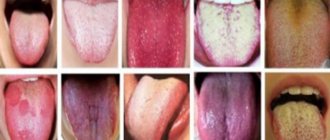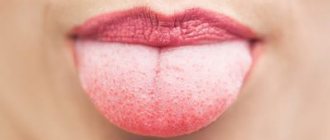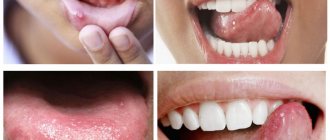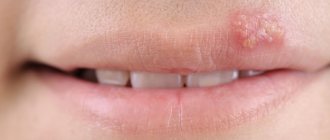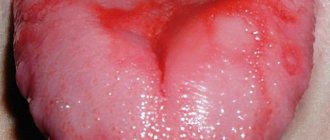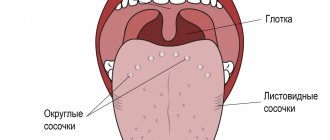Popularly, a pimple is a pimple on the end of the tongue. This organ contains many nerve endings; any formation causes pain and interferes with eating and speaking. No wonder even the curse appeared with the wish of the pip. Usually it is addressed to those who constantly gossip behind their backs and those who say nasty things and use foul language. So it’s not surprising that most interpretations of signs about a pimple on the tongue are negative. But in order to more accurately decipher the body sign, you need to pay attention to the accompanying factors - the place and time of appearance.
History of signs with pimples on the tongue
The tongue has always been a symbol of speech, and any pimples on the surface interfere with speaking and eating. This pattern was noticed in ancient times and logically connected - if language is speech, and a pimple inhibits conversation, then the event is a signal for the need to follow the words.
At a relatively later time, an opinion arose that this is how the “devil” punishes gossips, chatterboxes, liars who make impossible promises. Sometimes there are absurd interpretations of the event. For example, a pimple appears if you lick a toad (and a person will also become covered in warts).
There is even an opinion, not without basis, however, that “pips” will appear after licking an icicle or if the ice cream is licked rather than bitten.
Classification
As such, there is no classification of formations in the tongue, since their appearance is influenced by numerous exogenous/endogenous influence factors. Some authors classify these phenomena from an etiological point of view, and therefore distinguish several groups:
- Formations in the tongue of traumatic origin - acute and chronic mechanical trauma of the tongue, chemical trauma, physical factors (high/low temperatures).
- Formations on the tongue caused by local/general infection. Infectious agents in the oral cavity are often various strains of viruses ( adenovirus , retrovirus , herpes simplex virus , measles virus , HIV ), staphylococcus , streptococcus , fungi , fusospirillum .
- Formations in the tongue associated with sensitization of the body/disorders of immune processes. Such formations are based on the presence of reactive zones on the oral mucosa that react in a certain way upon contact with allergens of various origins (toxins, foods, drugs, etc.), contributing to the development of autoimmune reactions.
Why does a pimple pop up on the tongue according to signs?
The interpretation of why a pimple popped up on the tongue is different, for example, for girls it is always associated with the need to take care of themselves so as not to blurt out too much. And for young men there is more connection with the need to monitor the tone of speech and the level of rudeness. However, it is much more important to pay attention not to the gender of the person with the pimple, but to the place where it popped up - left, right, middle. Sometimes several pieces appear, then the largest one matters.
What does a pimple on the tip of the tongue mean?
A pimple in this area often appears for natural reasons (bitten tongue, change of weather, burn). However, there is a sign - a pimple has appeared on the tip of the tongue, which means you need to curb your temper:
- watch your tone, avoid rudeness;
- avoid rudeness, become more tactful;
- It is desirable to reduce aggression in communication; there are other ways to get rid of it, except for verbal attacks on the interlocutor for no reason.
It is especially important to pay attention to communication with your family. A pimple may be an advice to reduce the level of tension and rudeness in communication between relatives. It may take some strength of character to set new rules.
An alternative interpretation is that outside the family you need to maintain a distance in communication; one of your friends is dissatisfied with the excessive familiarity.
Important! Most often, the signs have absolutely nothing to do with it. A pimple appears from a lack of certain vitamins, irritation of the mucous membrane, an accidental bite or a food burn. Therefore, first of all, it is worth reviewing the diet and checking whether the body has enough nutrients.
One interpretation of superstition is that someone gossips about the victim, spreads dirty rumors, distorts the truth so as to tarnish his good name
What does a pimple in the center of the tongue mean?
A pimple in the center means 3 different things:
- The victim recently lied to someone, hiding an important truth. The sooner the offender repents, the sooner the pimple will go away.
- The victim was recently lied to. The intentions were the best, but the consequences of hiding the truth can be extremely negative. Having noticed a pimple, you should have a serious conversation with your family and friends, but it is better to avoid direct accusations.
- Someone from his circle recently revealed a secret entrusted to him. You will have to resort to all sorts of tricks so that those who find out do not consider the disclosed information to be true.
Despite beliefs, you need to pay attention that a pimple in the center of the tongue can pop up due to a minor burn from food or too sour food.
What does a pimple on the left side of the tongue mean?
A pimple on the left is a sign that you need to gossip less. It is advisable to take care of your personal life, not pry into the lives of others, spread rumors and waste precious time. Something important may pass by while a person is busy looking out for other people’s shortcomings, juicy details, and random mistakes.
Also, the pimple on the left warns - no one likes to give out unsolicited advice, it is better to refrain, perhaps the person will be more grateful if he remains silent.
An alternative meaning is that you cannot trust everyone; excessive naivety will lead to disaster, especially when secrets are important to keep, and information can really harm in one way or another.
Important! A pimple on the tongue can be a warning, but panic and paranoia should be avoided. You need to remember - often a pimple is just a pimple, and not a sign of heaven; excessive suspicion spoils relationships with people.
An alternative interpretation is that it is necessary to refrain from unsolicited advice, otherwise quarrels and conflicts are inevitable.
What does a pimple on the tongue on the right side mean?
The pimple on the right is a warning. Jumping into his tongue, he advises keeping personal information to yourself; even your loved ones should not reveal everything. There is a person nearby who is not trustworthy, perhaps among family, friends or just colleagues. Any careless word can result in unexpected troubles.
An alternative interpretation is that recently someone accidentally revealed his secret, so it is important not only not to talk about personal matters, but also to remain silent regarding strangers.
What does a pimple on the inside of the tongue mean?
A pimple in this place symbolizes the presence of hidden ill-wishers, two-faced friends, people who constantly weave intrigues against a person, and gossip. It is easy to identify enemies; they will be more interested in the trouble that has happened than others.
What to do with a pimple
People who are not superstitious treat pimples on the tongue with rinses and medicinal ointments, and dissolve honey and propolis. Superstitious people do the same thing, but at the same time they try to reconsider their attitude towards people: they promise themselves to never lie. They get ready to explain themselves to their ill-wishers, swearing never to meddle in other people’s affairs.
You should try to neutralize a negative prediction. Folklore offers several ways:
- Always wear a prayed talisman or red thread around your neck on a silver chain. It needs to be hidden under clothes.
- Take Holy water into your mouth, hold it, read “Our Father” in your mind, and swallow.
- Light a wax church candle, heat a needle on it, wrap it in white cotton thread and touch the pimple so that you feel pain, but do not prick. And then throw the needle and thread into the fire.
If the rashes are multiple and constantly appear, there is an infection in the body. It is necessary not to turn to folk wisdom for help, but to turn to official medicine. Most likely, you will need antibiotics, which should be prescribed by a doctor.
How to avoid what is predicted in omens
A pimple on the tongue, even regardless of superstitions, is an unpleasant thing, and taking into account popular beliefs, the mood deteriorates even more. To prevent a sign from coming true, it is usually enough:
- after paying attention to the pimple, really talk less about personal topics, watch your tone;
- if the pimple hurts a lot, in addition to the usual measures to eliminate unpleasant sensations, it is useful to ask for forgiveness from those who were allegedly recently offended;
- It is enough for non-superstitious people to leave the pimple unattended.
An alternative method, universal for all bad omens: as soon as an undesirable sign is noticed, you must say “mind me” and, if desired, spit over your left shoulder.
Important! If the pimple hurts for a long time, the redness spreads, it is better to consult a doctor. Inflammations should be treated before they spread.
An incident occasionally signals the need to pay attention to the atmosphere in the family; perhaps decisive measures should be taken to mitigate “small” conflicts and contradictions
Pathogenesis
The pathogenetic mechanisms of the development of various types of formations on the tongue are based on different processes - proliferative inflammation, dystrophies, tumor processes, sensitization of the body (specific/nonspecific) and allergic manifestations, injuries to the mucous membrane of the tongue, causing morphological, biochemical and functional disorders in the tissues of the tongue. Accordingly, the basis of morphological changes/reactions of tongue tissues is the reproduction/transformation of cellular structures, promoting the formation and proliferation of granulation tissue structures, atypical hyperplasia of the epithelial mucosa, which is manifested by the formation of granulomas , tubercles , nodules , vesicles and their necrotic changes of varying severity, characteristic of those or other diseases of the body and oral cavity, in particular.
Tests and diagnostics
The diagnosis is made based on examination of the oral cavity and patient complaints. If necessary, laboratory and instrumental examinations are carried out:
- Bacterioscopic examination - scraping from the mucous membrane of the tongue and microscopy of Gram-stained smears.
- Bacteriological examination (culture of material from the oral cavity on nutrient media).
- Analysis of saliva for the presence of an infectious agent.
- Blood sugar test.
- Clinical/biochemical blood test
- If necessary, gastroscopy, ultrasound of the abdominal organs to identify gastrointestinal diseases.
Prevention
Simple tips can help reduce the risk of inflammatory diseases of the oral cavity.
- Complete nutrition.
- Elimination of allergens from the diet.
- Avoiding irritating and hard foods that injure the mucous membrane.
- Careful oral hygiene (brushing teeth, using rinses and dental floss).
- Using a toothbrush with soft bristles, which also prevents injury to the mucous membrane.
- The use of pastes with antibacterial action.
- If inflammatory elements appear in the mouth, consult a dentist.
Diet
Diet Table No. 1b
- Efficacy: therapeutic effect after a week
- Terms: 10-30 days
- Cost of products: 1100-1200 rubles per week
Diet Table No. 1
- Efficacy: therapeutic effect after 3 weeks
- Terms: 2 months or more
- Cost of products: 1500 - 1600 rubles. in Week
Until complete recovery, you need to avoid hot, spicy and sour foods and drinks. Avoid rough foods that injure the mucous membranes of the tongue, gums and cheeks (chips, crackers, nuts, overcooked potatoes, meat and fish). The quality of the diet can remain the same, but all dishes should be pureed or soft to reduce trauma to the mucous membrane. In nutrition, you can focus on Table No. 1b and Table No. 1 , followed by a transition to normal nutrition.
List of sources
- Karakov K.G., Vlasova T.N., Lavrinenko V.I. Independent and symptomatic glossitis in the clinic of therapeutic dentistry // Textbook. Stavropol, Publishing and Information, 2012. – 102 p.
- Borovsky E.V., Mashkilleyson A.L. Diseases of the mucous membrane of the oral cavity and lips. // M., 2001, 73-90.
- Danilevsky N.F., Leontiev V.K., Nesin A.F., Rakhni Zh.I. DISEASES OF THE ORAL MUCOSA // Textbook. Moscow, 2001.- 268 p.
- Borovsky E.V., Danilevsky N.F. Atlas of diseases of the oral mucosa. - M.: Medicine, 1991.
- Beloklitskaya G.F. The use of chlorhexidine-containing drugs in dentistry (literature review) / G.F. Beloklitskaya // Modern dentistry. - 2001. - No. 1. — P.15-18.


